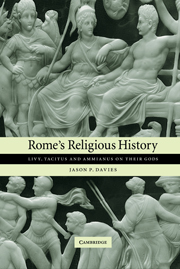6 - Conclusions
Published online by Cambridge University Press: 21 December 2009
Summary
Religion is a powerful theme in the three authors scrutinised here: indeed it might be said to be the backbone both of the historical record and of the transaction of Roman identity. Virtually every major battle and a great many other events are explained with reference to the gods. Historiography, in its role of explanation and characterisation, appropriated a particular role to itself in its synthesis of the competing religious knowledges: these self-appointed spokesmen for Rome's religious tradition were not directly ‘informing the public’ of a central canon, thrashed out at some mysterious policy-making thinktank. These accounts are each individual yet deliberately placed at the centre of religious authority: this was, self-evidently to the audience, a construction. The historical accounts created and negotiated a normative position and aimed at procuring enough general assent to facilitate any excursions into expert or controversial areas. Ironically then, the supposedly sceptical historians might be the closest thing we have to the voice of the ‘state religion’, at least in terms of text; not a specific formulation of a particular detail or set of circumstances (e.g. as Feeney argues for Horace's Carmen Saeculare), but a general framework of practice and interpretation.
Religion is central to the texts under scrutiny here: proper methods, pitfalls, the enactment of the gods' will – all represented over and over again for the reader's edification. Noting prodigies, their expiation, propitiating the gods, not offending the gods in one's actions (such as stripping a temple) or manner (such as boasting of one's felicitas), finetuning one's interpretation – all this is Roman religion in practice.
- Type
- Chapter
- Information
- Rome's Religious HistoryLivy, Tacitus and Ammianus on their Gods, pp. 286 - 291Publisher: Cambridge University PressPrint publication year: 2005

